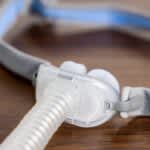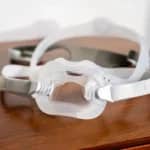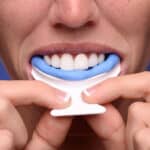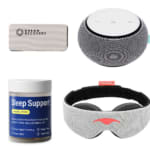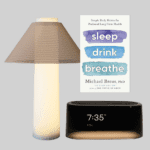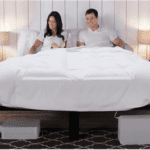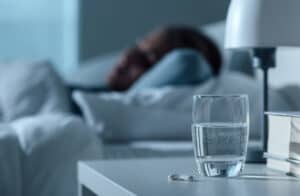Medical Disclaimer: The following content should not be used as medical advice or as a recommendation for any specific supplement or medication. It is important to consult your healthcare provider prior to starting a new medication or altering your current dosage.
The circadian rhythm operates on a 24-hour schedule and regulates when we feel tired and when we feel awake. Melatonin, a hormone naturally created by the pineal gland in the brain, plays a major role in this process by making us sleepy in response to darkness.
Synthetic melatonin can be taken in tablet or liquid form as a sleep aid and is available without a prescription. It is also available as a patch, so it may be absorbed by the skin, and as a suppository. We discuss how melatonin supplementation works, if it can help your sleep troubles, potential side effects, and dosage.
Key Takeaways
-
- Talk to a doctor before adding melatonin supplements to your routine.
- Start with a low dosage under the guidance of your doctor.
- Be mindful of potential side effects, including nausea and headaches.
- Look for reputable sleep supplements that have been third-party tested.
What Is Melatonin?
Melatonin is a hormone naturally produced by the body on a daily basis to help control the sleep-wake cycle. A person’s melatonin level is generally low throughout the day, then increases in the evening and peaks in the middle of the night. Light suppresses the release of melatonin, which is why we normally feel tired after dark.
Can Melatonin Improve Sleep?
Synthetic melatonin is designed to impact when a person feels tired and how tired they feel. Although melatonin supplements are not approved as a sleep aid by the U.S. Food and Drug Administration (FDA), research suggests melatonin may improve sleep for some people.

Melatonin for Adults
Adults may consider taking melatonin to address different sleep issues.
- Insomnia: Insomnia refers to when a person has trouble falling asleep and/or trouble staying asleep throughout the night. Doctors may recommend melatonin for insomnia, although research suggests people with chronic insomnia might not benefit from taking melatonin. Instead, cognitive behavioral therapy for insomnia (CBT-I) is the preferred first-line treatment.
- Jet lag: Jet lag occurs when a person travels across several time zones and is still accustomed to feeling tired and awake according to the time in their original time zone. Melatonin supplements may offer some relief from jet lag symptoms.
- Shift work: People who work at night or on a rotating schedule often have trouble feeling alert at work and sleeping when they would like. Research studies have produced mixed results about the effectiveness of melatonin supplementation for shift work sleep problems.
- Delayed sleep-wake phase disorder (DSWPD): People with delayed sleep-wake phase disorder have an unusual sleep schedule that is misaligned with daylight hours, causing them to stay up very late at night and sleep in until late morning or early afternoon. Melatonin supplements may help these individuals shift to an earlier bedtime.
Researchers continue to study the effect of melatonin supplementation for other disorders, such as cancer, heart problems, digestive disorders, and mental health concerns.
Melatonin for Children
Researchers have had some success in using melatonin supplements to treat sleep problems in children, particularly children with accompanying conditions such as autism, attention deficit hyperactivity disorder (ADHD), or eczema. Studies show taking melatonin before bed may help these children fall asleep faster and stay asleep longer, though more research is needed. Parents should consult with their pediatrician if they are considering melatonin supplements for their children.
Side Effects of Melatonin
Melatonin supplements are generally considered safe for short-term use and do not pose a high risk of serious side effects. The most common documented side effects include:
- Daytime sleepiness
- Headaches
- Dizziness
- Feeling cold
- Nausea
More research is needed to gain a clearer picture of melatonin’s potential side effects, especially when used for longer periods of time. With regards to using melatonin supplements for children, there are some concerns that melatonin may interfere with puberty, as it is a hormone.
Does Melatonin Interact With Prescription Medications?
As with any supplement, melatonin has the potential to interact with certain drugs. It is important to consult with a health care provider before introducing any new supplements or medications to your daily routine. They can help determine whether melatonin is a safe addition to your prescription regimen.
Antidepressants
Selective serotonin reuptake inhibitors (SSRIs) are a class of medications used to treat depression. Research has shown that taking melatonin in tandem with certain SSRIs may exacerbate some symptoms of depression, including fatigue and drowsiness. Some antidepressants increase the natural levels of melatonin in the body, and the introduction of melatonin supplements may heighten the hormone’s sedative effects.
Birth Control
Some studies suggest that melatonin is unlikely to affect the efficacy of hormonal birth control, but more research is needed to solidify this claim. Oral contraceptives with progestin have the potential to increase natural melatonin levels in the body, and the introduction of melatonin supplements may exacerbate sleepiness. Because research on the relationship between birth control and melatonin is inconclusive, it is best to consult with a health care provider before using melatonin with hormonal birth control.
Diabetes Medication
There are a number of medications used to treat diabetes, each with a different set of potential side effects. These variables, along with a patient’s unique biology, make it difficult to determine whether a specific diabetes drug will interact with melatonin. A study on the use of melatonin supplements in diabetes patients with insomnia found that the supplements could be a potentially useful sleep aid for those with type 2 diabetes, but more research is needed to determine melatonin’s level of safety and efficacy.
Melatonin Dosage
The correct dose of melatonin may vary depending on a person’s biology. Experts generally recommend taking between 1 and 5 milligrams per night, about 90 minutes before sleeping if ingested in tablet form. It may be best to start with a lower dose and gradually increase it, under the guidance of your doctor.
While melatonin overdose is uncommon, ingesting large amounts may result in negative side effects. Some signs of melatonin overdose include:
- Headaches
- Blood pressure fluctuation
- Nausea
- Dizziness
- Vivid or upsetting dreams
- Residual grogginess upon waking
How to Choose a Melatonin Supplement
Because the FDA does not regulate supplements, it is best to do your research before purchasing a melatonin supplement. Consider choosing a brand that has undergone third-party testing through organizations such as United States Pharmacopeia (USP).
Researchers have found that many melatonin supplements on the market are not accurately labeled and may contain more melatonin than claimed. Moreover, some supplements also contain unlisted substances such as serotonin, another neurotransmitter that comes with potential side effects of its own.
When to Talk to Your Doctor
Although melatonin supplements are available without a prescription, you should talk to your doctor before trying these supplements for the first time. This is especially important if:
- You are currently taking other medications
- You are pregnant or breastfeeding
- You have another medical condition
- You are interested in giving melatonin to your child
- You believe you might have an underlying sleep disorder
Your doctor can provide advice on whether melatonin is safe for you to take. They can also help identify and treat any underlying sleep disorders or other conditions that might be interfering with your sleep.
References
The Sleep Doctor Forum: Real Experiences, Real Connections
Continue the discussion on the Sleep Doctor Forum. Connect with experts and fellow forum members on CPAP, sleep apnea, and all things sleep. A priceless resource that’s free to join.



